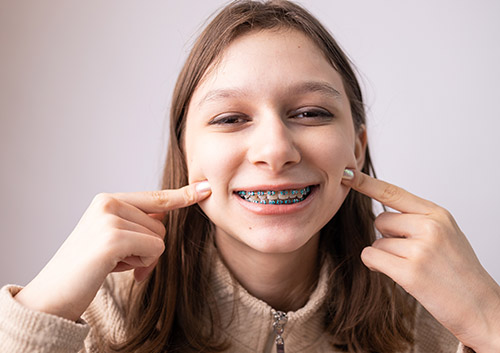Straight Talk about Your Smile
October 17th, 2025

Braces and aligners help straighten teeth and create a confident, attractive smile. And those visible benefits are amazing! But orthodontic treatment has an even more important purpose than transforming the appearance of your smile—and that’s protecting and improving your oral health.
If you’re ready for orthodontic treatment, you know you can look forward to a future of beaming smiles. You can also look forward to healthier teeth and gums and a more comfortable and functional bite. For some people, orthodontic treatment can make speaking and eating easier, and could even contribute to a better night’s sleep.
How can orthodontic treatment accomplish these goals? Let’s set the record straight!
Protecting Tooth and Gum Health
- Lowering Your Risk of Cavities
Perfectly aligned teeth are considered aesthetically pleasing, but there’s a more practical reason to appreciate straight teeth. Crooked and overlapping teeth make it easier for food particles and plaque to stick in between the teeth and harder for your brush to remove them. Straight teeth allow you to remove cavity-causing plaque more effectively and with less effort.
- Promoting Healthy Gums
When plaque and tartar build up around the gums, the gum tissue becomes irritated, which is the first stage of gum disease. When teeth are straight and evenly spaced, brushing and flossing are easier and more effective, and your gums reap the benefits.
Creating a More Functional and Comfortable Bite
A malocclusion occurs when the teeth and jaws aren’t properly aligned—they don’t fit together the way they should when you close your mouth. There are different types of bite problems, and these can impact both your oral health and your overall health depending on the type and the severity of the malocclusion. Once a malocclusion is corrected, patients can experience:
- Stronger Teeth and Healthier Gums
Teeth and jaws which don’t fit together properly put extra pressure on your teeth and gums, leading to problems such as worn enamel, cracked teeth, and gum recession. Protect your oral health by creating a well-aligned bite.
- A Pain-Free Bite
Left untreated, malocclusions can cause problems like temporomandibular joint disorder (TMD), headaches, face and neck pain, earaches, limited jaw movement, and painful chewing. Correcting your bite will protect your temporomandibular joint from harm and will relieve the discomfort and pain caused by a malocclusion.
Other Possible Benefits of Treatment
For those with more serious malocclusions, orthodontic treatment might improve daily life in unexpected ways:
- Improved Speech
It takes a lot of coordination to produce different sounds. The lips, the tongue, the alveolar ridge which holds our teeth, the hard and soft palates, parts of the throat, and, yes, the teeth all play a part in creating speech. Some kinds of malocclusions contribute to speech disorders such as lisps, which orthodontic treatment can help correct.
- Improved Digestion
Digestion starts in the mouth, not the stomach! As we chew, we break down our food into particles which are easier for the stomach to digest. If you can’t chew properly because your teeth are misaligned or a bad bite makes it too painful to chew food as thoroughly as you should, you won’t be getting the full nutritional benefits of your healthy diet. Orthodontic treatment helps you bite down painlessly and break down foods easily for better digestion.
- Improved Sleep
Bite problems can sometimes lead to sleepless nights. More serious malocclusions may cause mouth breathing, which, in turn, can affect the quality of your sleep. If you’re having trouble sleeping, a sleep specialist can help you discover the source of your problems. If your troubled sleep is caused by tooth or jaw misalignment, orthodontic treatment might be the solution.
Talk to your dentist to learn about the many options available to align your teeth and jaws for a healthy, attractive smile. Braces or aligners might be all you need to correct a mild malocclusion. Appliances and headgear can influence the growth and position of the jaw if needed. In more severe cases, surgery, together with braces, can create a proportional, healthy bite.
Whether it’s a confident smile, healthier teeth and gums, a functional, comfortable bite, or any of the other benefits orthodontic treatment can bring, talk to the dental team at Oak Grove Dentistry in Green Bay to discover how orthodontic treatment can help you achieve all of your smile goals!




 Website Powered by Sesame
24-7™
Website Powered by Sesame
24-7™